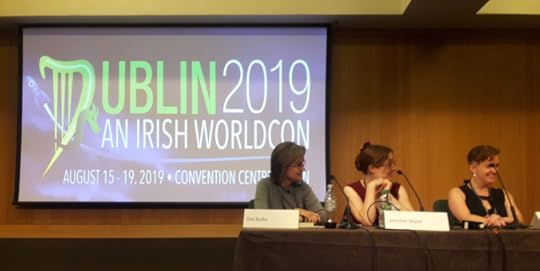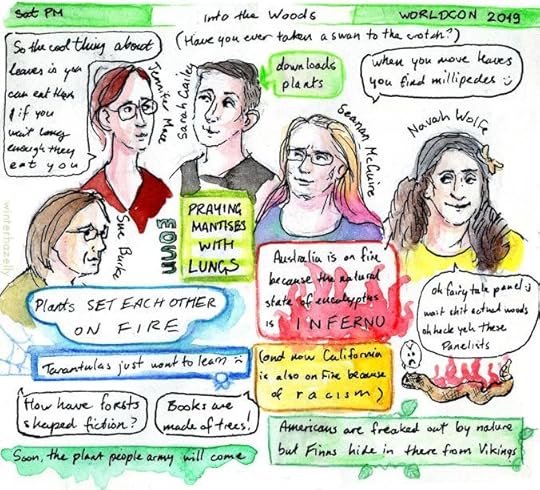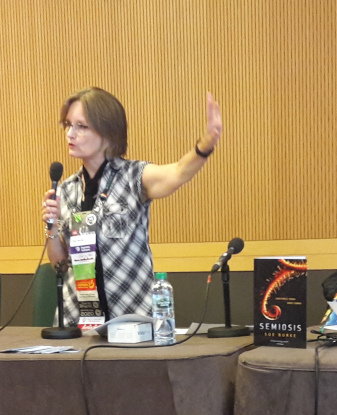Sue Burke's Blog, page 34
September 11, 2019
Streetlights with something to say




The streetlights have arms and personalities along Mayor Street Lower in Dublin, Ireland. I took these photos on my way from my hotel to the Convention Centre of Dublin while I was there for Worldcon in August.
September 3, 2019
The fun of an Irish Worldcon

On Saturday afternoon, I participated in the panel “Into the Woods: How have forests shaped fiction?” with Navah Wolfe, Jennifer Mace, Sarah Gailey, and Seanan McGuire, and we had fun.

This is what winterhazelly took from it. https://twitter.com/winterhazelly/status/1164615304451973121
Report: Dublin 2019, an Irish Worldcon
The 77th World Science Fiction Convention was held in Dublin, Ireland
August 15 to 19
Future Worldcons should be held in a Tardis. Popular events could be put on a time loop so anyone could attend even if they conflicted with other events. More importantly, every room for panels, ceremonies, readings, or other events could be bigger on the inside than the outside so everyone would fit in.
As with some other Worldcons, space became an issue in Dublin. The convention was sold out at about 5,800 people, which was a few more than the Convention Centre Dublin (CCD) could handle. To accommodate that, the Spencer Hotel hosted children’s programming. The Odeon Point Square, a movie theater and unfinished commercial space almost a kilometer from the CCD, hosted the Art Show, book launches, acoustic concerts, craft workshops, art projects, displays, autographs, some panels, and the academic program.
Convention volunteers and venue staff did the best they could for crowd control cheerfully and efficiently. Despite the inconvenience, the snaking queues to get into events became good places to meet new people.

On Sunday afternoon, I gave a reading, specifically the opening of Chapter 6 from Interference, in which Stevland gets into an argument with a locustwood tree.
Other than that, the convention was splendid: well-organized and always on time. Events started at 9 a.m. with accessible yoga and a “stroll with the stars” morning walk, and ended in the wee hours at Martin Hoare’s Bar – known as Martin’s, named for the volunteer who was to be Fan Bar Manager but who died a few weeks before the convention.
The city of Dublin made visitors welcome with a good selection of hotels and other accommodations, convenient trams and buses, museums, sightseeing, restaurants, and bars. Like many people from overseas, I came early to tour the city and country, which was as green and beautiful as I’d been told.
During the Worldcon, thousands of tempting events vied for attention. I was drawn to panels, talks, readings, a couple of concerts, a medieval combat demonstration, a stand-up comedy show, and a dance; I wandered through the Art Show and Dealer’s area, perused displays and fan tables, attended parties, and spent a lot of time meeting friends from around the world. I could have also attended podcast recordings, plays, films, and workshops, gone on a treasure hunt, run through the park, and joined in role-playing or board games.
Convention organizers deserve praise for the volume, quality, and variety of programming, including some deftly made last-minute additions and changes due to crowds or popular demand. We never forgot for a moment the delight of attending an Irish Worldcon and being wished a hearty fáilte (welcome) at every turn. The convention newsletter, The Salmon of Knowledge, often included bits of local lore, such as the legendary origin of the Giant’s Causeway.
Like many people, I watched the Hugos in the overflow viewing area, the Second Stage, with the ceremony live-streamed on a large screen. The room had tables, a bar and a rapt audience. The ceremony, with charming and enthusiastic presenters, was marred only by a robot captioning system that we quickly learned to ignore after it turned Ada Palmer’s references to Lord of the Rings and Game of Thrones to “bored with the rings” and “cream of thrones” during her introduction to the Campbell Award winner. Of course there was a word or two by the evening’s recipients that , but that’s a feature of the Hugos, not a bug, and it seems to have accomplished something.
For me, one of the many highlightss of the convention came on Saturday evening at the Bright Club Ireland, a stand-up comedy show. Steve Cross made an obessively deep textual reading of The Hitchhiker’s Guide to the Galaxy to determine the exact date that the Earth is destroyed by the Vogons. (Listen to a version of it here on BBC radio.)
John Scalzi’s Saturday night “Dance Across the Decades” turned one of the CCD halls into a three-hour writhing, rhythmic celebration of fannish ecstasy. It may become legend. Its stomping, sweaty crowd no doubt broke at least three distinct safety regulations, but the CCD staff wisely turned a blind eye.
August 3, 2019
Where to find me at Worldcon
 This year’s World Science Fiction Convention, or Worldcon, will be in Dublin, Ireland, from August 15 to 19. About 5,000 people are expected to attend. If you’ve never been, events include panels, gaming, writing workshops, costumes, speeches, awards, movies, music, dancing, parties, art, science, theater, children’s activities, and a lot more.
This year’s World Science Fiction Convention, or Worldcon, will be in Dublin, Ireland, from August 15 to 19. About 5,000 people are expected to attend. If you’ve never been, events include panels, gaming, writing workshops, costumes, speeches, awards, movies, music, dancing, parties, art, science, theater, children’s activities, and a lot more.
Worldcons are run by us fans — no paid staff. This helps account for the variety of activities. The size of the venue, not our collective imagination, is the only limitation. That’s why when you buy your ticket, it’s a membership fee. You don’t just observe, you belong.
I’m scheduled for four events:
Panel: Continuing relevance of older SF
Friday, August 16, 11:30 to 12:20, Odeon 4 (Point Square Dublin)
We are in a new millennium, a literal Brave New World. Surely much of the fiction of the 20th century no longer holds relevance? Or does it? The panel will discuss the fiction of the past and how it can still be relevant in the 21st century. What lessons from older authors such as Orwell, Asimov, Butler, Delany, Kafka, and Atwood can we apply to our app-loaded, social media-driven age?
I’ll moderate panelists Alec Nevala-Lee, Aliza Ben Moha, Robert Silverberg, and Joe Haldeman.
Book launch: World Science Fiction #1: Visions to Preserve Biodiversity of the Future
Saturday, August 17, 12:30 to 13:30, Point Square: Warehouse 2 – Performance space
Science fiction happens everywhere! World SF #1 collects some of the best stories published by Future Fiction, a multicultural project created by Francesco Verso to preserve the narrative biodiversity of the future. Come and celebrate these science fiction stories from thirteen countries and six languages. I translated the story “Francine (draft for the September lecture),” by Maria Antónia Marti Escayol. There will be light refreshments.
Panel: Into the woods
Saturday, August 17, 16:00 to 16:50, Wicklow Hall-1 (CCD)
From Little Red Riding Hood’s forests to Annihilation’s eldritch fungi, nature and plants have been a powerful force in fiction from historical fairy tales to far-future hydroponics. How have forests shaped fiction, and how has the use of nature in fiction changed over time? What do we love — or hate — about leaves?
Navah Wolfe will moderate panelists Jennifer Mace, Sarah Gailey, Seanan McGuire, and Sue Burke.
Reading: Sue Burke
Sunday, August 18, 17:30 to 17:50, ECOCEM Room (CCD)
I’ll read from Interference, the sequel to the novel Semiosis, and something else fun and plant-related.
***
My husband and I are also coming to Ireland a week earlier as tourists. We’re preparing to be enthralled by the beauty of the Emerald Isle, the depth of its culture, and the charm of its people.
July 30, 2019
Stranger than Sci-Fi: Talking Plants – on BBC Radio 4
 If you’re in Britain, you can hear me at 21:00 tomorrow, July 31, on BBC Radio 4, as part of the Stranger than Sci-Fi show’s episode “Talking Plants.”
If you’re in Britain, you can hear me at 21:00 tomorrow, July 31, on BBC Radio 4, as part of the Stranger than Sci-Fi show’s episode “Talking Plants.”
I’ll provide some strange science fiction ideas for your hosts, physicist Dr. Jen Gupta and comedian Alice Fraser. Discover real-life science that sounds too strange to be true.
If you’re not in Britain, you can listen anytime after the broadcast, online at https://www.bbc.co.uk/programmes/m0007623.
July 24, 2019
My Goodreads review of “Cat Pictures Please and Other Stories”
 Cat Pictures Please and Other Stories by Naomi Kritzer
Cat Pictures Please and Other Stories by Naomi Kritzer
My rating: 5 of 5 stars
The seventeen short stories in this collection include the Hugo Award-winning “Cat Pictures Please.” That story begins with the words “I don’t want to be evil.”
In a way, that summarizes all these stories. The protagonists don’t want to be evil – but they have problems: a terminal illness, a missing piece from their soul, captivity, or horrible mistakes made by their parents. They may find themselves searching for their real parents, measuring alien penises, missing their friend’s robot, falling in love with a mortal, watching the Berlin Wall fall, or trying to cook for a houseful of quarantined children during a long and disastrous pandemic with dwindling food supplies.
Most are fantasies, most center on women’s lives, and invariably they are humane, sometimes even gentle, yet fascinating. The breadth of Kritzer’s imagination is on display, along with her sense of humor. If you like “Cat Pictures Please” (read it here if you haven’t), you’ll love this book.
July 17, 2019
All the good names have been taken
[image error]
So much beer, so little liver.
You may have noticed a trend to give strange names to beer. (Wines, too.)
For example:
Arrogant Bastard Ale,
Great Big Kentucky Sausage Fest Imperial Brown Ale,
Sexual Chocolate Imperial Stout,
Bitzkreig Hops Double IPA.
Does this help sell beer? Maybe the first purchase. I wanted to buy a six-pack and I saw Space Station Middle Finger. I like science fiction. It sounded like fun.
The carton said: “From the dawn of time, humans have looked to the sky for answers. Space Station Middle Finger replies to all from its eternal orbit. Behold and enjoy Space Station Middle Finger, a bright golden American Pale Ale.”
So I bought it, and it was a fine brew with a citrus-like tang, not as highly hopped as some American pale ales, and overall very satisfying. As I drank, I admired the artwork on the label, which could have appeared in an episode of Red Dwarf, and that was a pleasant thought.
Tasters at Beer Advocate also had a good opinion of the ale.
Would I buy it again? Sure. But wandering through a beer aisle or perusing a display cooler yields no shortage of tempting fermented adventures. A brand has to find a way to stand out. A strange name helps, I guess, but what happens when all the strange names are taken?
July 10, 2019
My Goodreads review of “Radicalized”
My rating: 4 of 5 stars
This book isn’t a novel, it’s four novellas – but I like short fiction, so that’s fine. The stories are all united by “our present moment,” as the cover says. I think some are more successful than others, but they all capture a truth about what’s happening now.
“Unauthorized Bread” explores the ways that technology and laws can control poor people and take from them what little money and freedom they have. They fight back, and the story dives deep into exactly how they rebel with a satisfying level of detail. The happy ending, though, seems a bit strained, although I want to believe it.
“Model Minority” has one big plot hole the story can’t successfully explain away. How did the superhero American Eagle, who is not stupid, spend so many years on Earth in the United States and not know the basic facts about racism? The lectures to get him up to speed seem didactic – which doesn’t make them any less true. He learns there’s no super-strength shortcut to justice.
“Radicalized” left me with one question. In the story, people who have been screwed over by health insurance companies decide to take revenge against the executives who sentenced them or their loved ones to needless suffering and death. My question: Why isn’t this happening now? The anger is out there and easy to find.
“The Masque of the Red Death” is a modern retelling of an Edgar Allan Poe story. A rich guy holes up in a bunker to escape the ravages of a catastrophe. He and his friends are arrogant asshats, and they get what’s coming to them. It’s a brutal kind of fun to watch them fail while the key to survival lies elsewhere.
Chernobyl thirteen years ago
Welcome sign to Chernobyl. Photo by Sue Burke
I’ve uploaded a new article to this site, Chernobyl: the half-life of war. I visited Chernobyl in 2006, twenty years after the disaster, then I came home and wrote about what I’d seen and learned.
Despite all my pre-visit research, the site wasn’t what I expected. It was grim, but not entirely: flowers were blooming at the Visitor’s Center, the forest was thriving, and the charm of the abandoned city of Pripyat was still apparent. During my visit, I learned that much of the radiation had sunk into the soil, where it was brought up by trees. A forest fire would release the radioactivity, so the forest rangers had to closely monitor the area, ready to act. It was neither a wasteland nor a fit place to live.
A recent HBO miniseries, Chernobyl, has dramatized the disaster. A bigger question remains: Why did it happen? In my article, I conclude that it was caused by desperate energy policies as the Soviet Union tried to win the Cold War. The Cold War ended, in part because of the Chernobyl disaster, but energy policies around the world remain desperate and misguided, and the world is still preparing for war. Fresh disasters hulk on the horizon.
June 26, 2019
My translation of “Techt” by Sofia Rhei: one tricky little success and one lingering failure
[image error]Aqueduct Press recently released Everything Is Made of Letters, a collection of short stories by Sofia Rhei. She’s an accomplished author with an engaging personality, and we became friends while I was living in Spain.
I originally translated her short story “Techt” for the anthology Spanish Women of Wonder. Sofía tells a thoughtful, touching account of an old man living in poverty in a hostile future. Language has become debased as well — or perhaps as a consequence — and can no longer express complexities. He strives to maintain what literature and “long” language have to offer humanity: sophisticated ideas, beauty, and a life of richer meaning.
Aqueduct Press put up a sample of its book, and it includes the full text of “Techt.” You can read it here.
Overall, I’m satisfied with my translation. I think I handled one tricky little detail effectively. A chart on Page 17 of the book shows “Alphabet 100,” a simplified form of communication using symbols, and the text explains what some of the most frequently used symbols mean. In the original Spanish:
@ – a, K – que, Ð – de, & – además
[image error]Literally translated, it says:
@ – at, K – that, Ð – of, & – also
I saw that the meaning of @ and & are the same in English, so I didn’t need to change them for the translation. K presented a problem that was easy to solve: K is used in English as an abbreviation for OK, and I could substitute that meaning without doing violence to the original text.
Ð in Spanish has been used, especially in old documents, as an abbreviation of DE (of), but the symbol has no common use in English. I could have asked for the symbol to be substituted for something else in the original chart in the text, but I knew it would be so much easier to find some sort of adaptation. I researched until I discovered one.
It turns out that Ð is a letter in Old and Middle English, and it represents the sound of “th” in “the.” That substitution would work. Problem solved!
I couldn’t figure out how to solve anothe problem, and I feel bad because I failed. The original text features debased oral language: “Ké zer nau?” “Yob’m film!” “Nvío urgent. Krtera decir tú sign.”
My translation: “Wat du nao?” “Job’n film!” “Erjnt mes. Caryer say yu ident.” (They make more sense in context, don’t worry.) I think that’s a reasonable translation except for one thing. The original, you might notice, is Spanish heavily influenced by English.
English. It has a growing hegemony in the world, imposing itself on other languages, and its presence in debased discourse in the story implies something significant to Spanish-language readers. English is cool, thus Spanish is not as cool, so English is used needlessly in Spain these days in a way that doesn’t always advance or enrich communication, which breeds resentment among some Spanish-speakers. This article published by an important watchdog of the Spanish language, Fundéu BBVA, tries to refute the idea that English is the “enemy” of Spanish. The fact that the idea needs refuting tells us it exists.
I could not figure out how to express the subtext in the story that English has helped deteriorate Spanish, since English is the culprit here. Sometimes it can be hard to see the forest for the trees. The story “Techt” stands strong even without that missing detail, but my instinct as a translator is to bring you everything a reader in the original language would have understood and everything the author was trying to say. I failed, and it bothers me.
June 16, 2019
My father: some of his little-known, not always licit, achievements
My father, Richard Burke, died in 1996 of complications from prostate cancer.
Here are few things not everyone knew about him:
[image error]He played on the defensive line of the Marquette University’s Golden Avalanche football team during the late 1940s. To earn a little money on the side, he also briefly (and secretly, since it was forbidden by college sports rules) fought as a professional wrestler under the name “Tiger Dick.”
When he was cut from the team, he was drafted into the Marines, where he served as a Marine sharpshooter and MP. He was also a semi-professional gambler at the time, and he and some fellow Marines opened a clandestine casino on base — but only for about a month because “that’s how long the bribes lasted.”
(I’m not a great card player, but he taught me some useful strategies that I don’t share with potential rivals, so don’t ask.)
He never had occasion to face combat, but as an MP he once stopped an attempted rape. He warned the perpetrator, “Halt or I’ll shoot!” and, since the circumstances required it, he would have shot to kill. He recalled that incident with pride at his resolve to do what he had to do without hesitation. The perpetrator wisely halted.
[image error]He went on to work in supervisory positions in heavy manufacturing. He eventually held three patents. He also raised four children, adored his wife, enjoyed pro and college football, could fix anything as a handyman, and was an excellent sport fisherman.
Later, he capitalized on his long experience in manufacturing to do some industrial espionage. He said the spy work wasn’t especially sneaky. He would simply observe what a company was doing during a public factory tour, for example, and since he understood manufacturing processes so well, he could deduce their secrets.
When he retired, he volunteered to lead tours at historic Fort Concho in San Angelo, Texas, headquarters to Pecos Bill and the Buffalo Soldiers.




